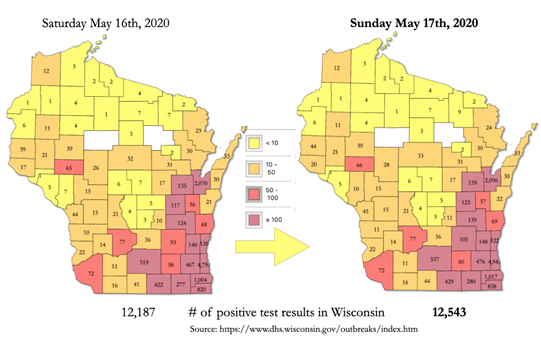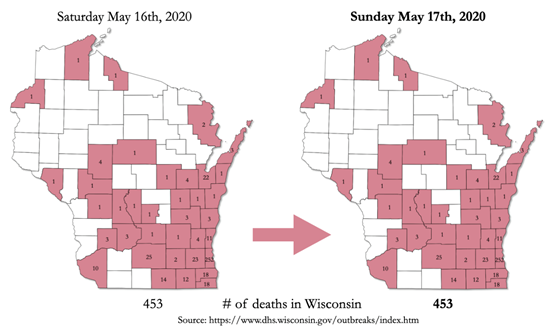Florida
As of May 16th
The Governor of the State of Florida has published an executive order that the restriction in Section 2(A)(2) of Executive Order 20-112 which limited the opening of certain businesses no longer applies to Broward and Miami-Dade Counties with effect from May 18, 2020.
Georgia
As of May 18th
- Daily State Public Health stats
- As of 1:00 p.m. today, Georgia has 38,081 confirmed cases as compared to 37,147 at 1:00 p.m. Saturday, with 6,916 hospitalized patients as compared to 6,735 at 1:00 p.m. Saturday, and 1,642 deaths as compared to 1,592 at 1:00 p.m. Saturday. Over 364,000 tests have been administered.
- In-person advance voting begins today. More than 1.4 million Georgians have now requested mail-in ballots. R and D requests are much closer now.
- The Falcons plan to reopen their facilities on Tuesday.
- Election officials can begin opening absentee ballots eight days before Georgia’s June 9 primary, according to a State Election Board rule approved Monday to deal with a deluge of mailed-in ballots during the coronavirus pandemic.
- The board voted unanimously to pass the emergency rule, which will help election officials handle record numbers absentee ballots. In previous elections, absentee ballots couldn’t be processed until election day.
- Even though ballots can be opened in advance, election results in some races might not be known for several days after the primary because of the time needed to count absentee ballots.
Minnesota
As of May 18th
Termed the “Pandemic Session” by Speaker of the House Melissa Hortman, the 2020 Regular Session adjourned Sine Die at midnight Sunday. While the Minnesota Constitution requires the Legislature to adjourn today, the Constitution also prohibits the Legislature from passing any legislation on the last Monday of the biennial session. This resulted in a weekend of busy negotiations and attempts to resolve their priorities. The Minnesota Legislature technically won’t return until January 5th, 2021. However, the Governor’s Peacetime Executive Order, which grants him the authority for all other COVID-19 Executive Orders expires on June 12th. If the Governor wishes to extend that order for an additional 30 days, when the Legislature is not in session, he must call the Legislature back. The Legislature does not have to approve the order – but must be given the opportunity to reject the order. According to Senate Majority Leader Paul Gazelka, the Governor has indicated he plans to bring them back on the 12th of June to meet this obligation. At that time, it is likely the Legislature will also try to address a number of issues they were unable to resolve in the final days and hours of the Regular Session.
The 2020 Session, which started in mid-February, was initially focused on the passage of a bonding bill in excess of $1 billion, approval of state employee contracts, tax relief, federal tax conformity, investments in early childhood education and a handful of unresolved policy issues left over from the 2019 Session. In late February, it was announced the state had a $1.5 billion budget surplus and roughly $2.5 billion saved away in the state’s budget reserves. And then, COVID-19 changed everything. The Minnesota House initially pushed for remote hearings, an extended recess and the implementation of many of the CDC’s recommendations for limiting the spread of the Coronavirus. The Senate’s initial response was to try and maintain a working presence at the Capitol. As we learned more about the virus, the Senate also began to implement their own policies and procedures to address the virus’s spread. Zoom meetings, legislative participation in floor debates by phone and lengthy roll call votes made the process for considering legislation and passing bills extremely challenging and time consuming. Legislative negotiations were also impacted when the Governor and Leaders were unable to meet in person making the back and forth process all that more difficult.
Over the past few weeks, the legislative focus changed. Bills were passed allocating funds to address a number of COVID-19 challenges. The state’s surplus turned to a deficit. Money the Legislature had hoped to use to fund new programs and projects disappeared. The state’s financial uncertainty dramatically impacted the session’s early goals. While the Legislature was able to work in a bi-partisan manner early in the crisis, as the session drew near to an end partisanship returned. Over the weekend, the minority party in both bodies failed to provide votes necessary to reach the 3/5th vote necessary to commit the state to long-term debt and passage of a bonding bill. The GOP led Senate rejected the labor contracts negotiated by the Walz Administration, out of concerns related to the raises in the second year of the contract. Negotiations also broke down over a potential tax bill and legislation establishing a process for distributing the state’s $1.8 billion in federal CARES money.
As part of that Special Session, the Legislature will try once again to complete items they were unable to resolve before adjourning. The bonding bill, approval of state worker contracts, a tax bill and oversight of federal funds disbursement from the CARES Act are all on the list of potential bills. It is possible other items related to COVID-19 and policy provisions which were close to being resolved prior to the adjournment could also return.
Today, is typically reserved for retirement speeches from members of the House and Senate who will not return in 2021. As of this morning, 14 members of the Legislature have announced their retirement. Some of those retirements to seek other offices, others to return to their hometowns. The House has chosen to continue with the process on the floor this afternoon, however instead of a chamber packed with members and families, hugs and tears, members will address the body via ZOOM, over the phone and a few from the floor of the House Chamber. The Senate, initially planned to conduct today’s session from the South Lawn of the Capitol. Senator Gazelka hoped this would allow all members to be in attendance and participate. However, facing some pushback the Senate has decided to hold their retirement speeches when the Legislature returns in June for the Special Session. There are typically a few surprise retirements and we will provide a list in the coming days.
Missouri
As of May 15th
The 100th General Assembly (that’s 200 years) has concluded. We have seen a lot of strange sessions over the years. We’ve seen the Senate shut down for the entire final week because of a PQ. We’ve seen a Speaker of the House resign in scandal. We’ve seen a Governor endure a four-month legislative investigation. But this COVID-Session has been more disruptive than any of those. Five critical weeks of the Session were erased as we all worked from home. One member of the General Assembly (Rep. Joe Runions) was diagnosed with the coronavirus. The legislature only ended up approving 51 bills. The General Assembly has averaged 133 bills passed for each of the last 10 years and 76 was their low output during that time.
Missouri has now reported 10,492 cases of coronavirus and 566 deaths. One week ago, we were at 9,410 cases and 449 deaths. All stay-at-home orders in Missouri will expire by the end of this weekend, although several local jurisdictions have social distancing guidelines that exceed those set at the state level. The Missouri Gaming Commission this week extended an order to keep riverboat casinos closed at least through May 31.
Following is the final outcome of the bills that shaped this Session.
TRULY AGREED AND FINALLY PASSED
Punitive Damages and Missouri Merchandising Practices Act
Sen. Bill White’s SB 591 would restrict punitive damage awards in personal injury cases and modifies provisions related to unlawful merchandising practices to limit frivolous lawsuits in those cases. The merits of this bill were brokered during a 20-hour filibuster of the asbestos tort reform bill.
CLEAN(er) Missouri
Sen. Dan Hegeman’s SJR 38 will ask voters this Fall to decide whether they want to: Bring back the bipartisan commission that has drawn Missouri state legislative maps in the past; move the priorities considered by the redistricting commission back to their previous order; ban all lobbyist gifts, and; lower campaign contribution limits.
Broadband Internet Grants & 5G Deployment
This proposal by Sen. Dan Hegeman and Rep. Louis Riggs extends the sunset provision of the Broadband Internet Grant program from 2021 to 2027. This program provides grants to local internet service providers to extend broadband to unserved and underserved areas – which are mostly found in rural parts of northern and southern Missouri. Gov. Mike Parson originally asked the legislature to appropriate $10 million for this program for the next fiscal year, but it ended up with no funding in final appropriations bills. Expectations are that funding will rebound after the economy recovers next years. The bill also granted another four years to cell phone companies to deploy 5G technology.
Natural Gas Utility Infrastructure
HB 2120 will remedy a recent ruling by the Western District Court of Appeals that said that natural gas companies cannot recover costs for the replacement of bare steel and cast-iron pipes. The Missouri Public Service Commission had long held that those pipes met the definition of “worn out or deteriorated” and, thus, allowed natural gas companies to recover costs for replacing them.
TTD/CID Reform
The General Assembly has received a lot of criticism during these last three weeks of session for ballooning small, simple bills in to large, omnibus bills that contain provisions well beyond the scope of the original bill. HB 1854 is an example of this. When the bill passed, it contained a provision that will make it significantly more difficult to create a new Transportation Development District or Community Improvement District. Under current law, the creation of one of these districts requires a favorable vote of the residents who reside within its boundaries. This bill will require a favorable vote of all of the residents of the municipality of with which the district is contained.
Hyperloop
This bill is a gesture meant to attract the development of Virgin’s Hyperloop test track to Missouri. The eventual goal would be the development of a track from Kansas City to St. Louis. This bill modifies provisions of the Missouri Public-Private Partnerships Transportation Act to include a tube transport system. The bill prohibits the hyperloop from ever utilizing eminent domain for its development or being placed in MODOT right-of-way. The State would not be able to expend money from the State Road Fund for its development.
NOT PASSED
Prescription Drug Monitoring Program
After eight years of failed attempts, Missouri remains the only state without a prescription drug monitoring program. The bill’s outlook looked promising when the Senate’s Conservative Caucus reached a compromise with Sen. Tony Luetkemeyer and HB 1693’s sponsor, Rep. Holly Rehder, to craft a proposal that would allow for a privatized version of the PDMP that only doctors and pharmacists will be able to access. Law enforcement and other government officials will not have been able to access the program. However, the House’s Conservative Caucus was not on board. They united with Democrats, who didn’t like the watered-down version, to vote down the bill on the House floor during the final week of session.
Grain Belt Express
A highly unusual coalition of Democrats and members of the Senate’s Conservative Caucus united to block an attempt to stop the development of the Grain Belt Express transmission line. Speaker Elijah Haahr made stopping this project his top priority for the last two years. This project has already been approved by the Missouri Public Service Commission and affirmed by the Missouri Supreme Court.
Online Sales Tax
Missouri and Florida remain the only states, with a state-level sales tax, that have not ratified an online sales tax. SB 648, sponsored by Sen. Andrew Koenig, would have required online vendors to collect and remit sales tax to the State if they have receipts from sales of at least $100,000 annually to Missouri consumers. The bill bogged down over Sen. Koenig’s proposal that would have offset the newly collected sales tax by adding a .11% reduction to the ongoing phase down of Missouri’s personal income tax – ultimately reducing Missouri’s personal income tax rate to 4.99%.
Video Lottery Terminals
This proposal would have legalized video lottery terminals in Missouri gas stations, truck stops, bars, and fraternal organizations. The proposal was opposed by the state’s casinos and legislators who don’t want to expand gaming.
Sports Betting
The legislature also failed in its attempt to legalize sports betting. This bill bogged down in a fight between casinos and some of the professional sports leagues who wanted to mandate that the casinos purchase official statistics from the leagues. The proposal also received opposition from legislators who don’t want to expand gaming.
Biodiesel Mandate
This proposal would have required diesel fuel sold in Missouri to contain at least 20% biodiesel blend – commonly made from soybean oil. This was a top priority of the Missouri Soybean Association and the Missouri Farm Bureau. Conservative members of both chambers fought against this proposal based on anti-free market principles.
Public Safety
Rep. Ron Hicks and Senate President Pro Tem Dave Schatz both had proposals that would have lifted the residency requirements for St. Louis City police officers. The House expanded the bill to lift residency requirements for police officers throughout Missouri. This is legislation failed to garner the support of the many Saint Louis City and County legislators which ultimately kept it from making the proposal to the Governor’s desk.
The House also considered a proposal that would have created a fund for police departments to use for witness relocations in murder cases. This legislation was intended to ensure that witnesses could be protected while waiting for a trial. Rep. Jon Patterson, the sponsor of the legislation, was hopeful that this would encourage more witnesses, especially in St. Louis and Kansas City, to come forward in violent crime cases.
Charter School Expansion
This proposal would have expanded charter schools to all counties with a charter form of government (St. Louis County, St. Charles County, Jackson County, and Jefferson County) and all municipalities with over 30,000 residents. The legislation would also have closed charter schools that have underperformed for three out of five years. The legislation moved swiftly through the Senate’s committee process but was unable to gain traction after the legislature recessed for the Coronavirus outbreak.
Charter Funding Equity
This proposal would have made the public funding available for charter schools equal to the funding for district schools. Under the current funding formula, charter schools are underfunded because the definition of “local effort” in the funding formula has not kept up with what is actually considered “local effort.” This bill would have redefined “local effort” to ensure that all local dollars intended for charter schools do in fact go to charter schools. Currently in Kansas City, more than half of the students in public schools are in charter schools. This has resulted in a funding discrepancy based on the way funding flows from the state to the charter schools. While this is not yet a problem in St. Louis, it likely will be in two or three years. These two issues have resulted in a roughly $1,100 difference between a child educated in a Kansas City public school and a child educated in a Kansas City charter school. The Kansas City Public School District has publicly agreed that there is a discrepancy and that it should be addressed. However, KCPS did not support Rep. Richey’s legislation. It is expected that this legislation will be a priority during the 2021 session.
529 Savings Accounts Tax Credit
Sen. Mike Cierpiot’s SB 581 would have created a fund in the State Treasurer’s office to start Missouri MOST 529 accounts for low income students. Under this legislation, individuals and corporations that donated to the fund would have received a 100% tax credit for their donation. The funds would have then been used to establish Missouri MOST accounts for children who were living in a household earning up to 200% of the free and reduced-price lunch calculation.
Low Income Housing Tax Credits
Former Gov. Eric Greitens shut down Missouri’s Low Income Housing Tax Credit program in 2017 in an effort to force compromise on reforms to the program. The legislature tried, and failed for the second year, to reform the program to entice Governor Parson to turn it back on. This bill would have placed a cap on the program equal to 72.5% of the amount of federal Low Income Housing tax credits annually allocated to Missouri, among other reforms. Gov. Parson could ask the Missouri Housing Development Commission to administratively institute reforms and turn the program back on at any time.
TIF Reform
Sen. Andrew Koenig had sought to reform (and reduce) the use of tax increment financing. SB 570 would have required third-party verification of a TIF district’s qualifications, limit the use of TIFs in retail developments, and prohibit TIF use in greenfields and floodplains – unless the floodplain is located within a port district or a levee drainage district created prior to the enactment of this law. The prohibition on floodplain use would not have applied to floodplains within Jackson, Clay, and Platte counties and the cities of Springfield and St. Joseph. All TIF usage would have been prohibited in floodplains located within St. Charles County. Ambulance districts, fire protection districts, and certain governing bodies operating a 911 center would have received a reimbursement from the TIF special allocation fund. The bill also would have allowed the City of St. Louis to deposit a portion of TIF revenues into a fund for infrastructure projects. The bill also contained language that would have allowed school districts to exclude their operating levy from TIF proceeds.
TIME Zones
Sen. Lincoln Hough tried to create the Targeted Industrial Manufacturing Enhancement Zones Act. This program would have allowed cities or counties to redirect withholding taxes generated by the creation of new jobs to be used to fund public infrastructure associated with the attraction of those jobs. The program had a $5 million cap and a 2024 sunset.
New Jersey
As of May 16th
The Governor of the State of New Jersey has published an executive order stating that beaches, boardwalks, lakes, and lakeshores in the State may be open to the public as long as these spaces are used and maintained consistent with various restrictions and recommendations.
All restaurants, cafeterias, dining establishments, and food courts, with or without a liquor license, all bars, and all other holders of a liquor license with retail consumption privileges located on the public and private beaches, boardwalks, and lakeshores, including concessions, snack bars, and food trucks, remain limited to offering only food delivery and/or take-out services.
The Governor of the State of New Jersey has published an executive order permitting the resumption of non-essential construction, curbside pickup at non-essential retail businesses, and gatherings in cars.
New York
As of May 15th
The Governor of the State of New York has published an executive order that directs, amongst other provisions, that the previous Executive Orders which together constitute “New York On PAUSE”, are continued until 11:59 p.m. on May 28, 2020, unless later amended or extended by a future Executive Order.
However the reductions and restrictions on the in-person workforce at non-essential businesses or other entities no longer apply to Phase One industries in regions that meet the prescribed health and safety metrics.
North Carolina
As of May 18th
Laboratory confirmed Coronavirus cases: 18,512
Coronavirus deaths: 659
Currently hospitalized: 493
Completed tests: 248,944
Number recovered: 9,115
NC Counties affected: 99/100
North Carolina Churches Meet After Pandemic Restrictions are Blocked (Raleigh News & Observer) Much of the debate in the last week over Gov. Roy Cooper’s stay-at-home order centered on religious gatherings. His office sought to clarify the order limiting indoor services to 10 people, but Republican state senators objected, some county sheriffs said they would not enforce the rule, churchgoers rallied in protest, and a federal lawsuit was filed. Governor Cooper’s office did not appeal the ruling.
Shoppers, Business Owners Anxious for Phase 2 Reopening, as COVID-19 Cases Spike (WRAL) Over 800 new coronavirus cases were reported by the state over the weekend. The news comes as more testing is being done and as businesses continue to welcome customers while also practicing social distancing. Saturday’s numbers were the largest spike in cases the state has had since the pandemic began.
NC Budget & Tax Center: COVID-19 Could Impact Economy for Decades (WWAY) The NC Budget and Tax Center predicts North Carolina could see economic impacts from the coronavirus for years. The NC Budget and Tax Center hosted a briefing Friday on the state’s economic outlook ahead of the General Assembly’s session on Monday. Presenters discussed unprecedented job losses, disproportionate impacts on marginalized communities, and the likelihood of a prolonged downturn.
Poultry Producer Closes Two Plants for COVID-19 Deep Cleaning (WRAL) A poultry producer is temporarily closing a North Carolina plant for cleaning amid the COVID-19 outbreak. Tyson Foods spokesman Derek Burleson said one of two fresh meat plants at its Wilkesboro complex was closed from Thursday to Tuesday. A second fresh poultry plant at the site will continue limited operations. The closure, following another temporary closure for cleaning, will allow “additional deep cleaning” due to sick workers and quarantine-related absences.
If You Belong to One of These Groups, You Should Get Tested for Coronavirus (WCNC) North Carolina Department of Health and Human Services Secretary Mandy Cohen, M.D. issued guidance last Friday on who should get tested for COVID-19.
NC Senate Committee Will Meet on Unemployment Oversight (North State Journal) When the General Assembly returns on Monday, one closely watched committee hearing will be concerning unemployment benefits in North Carolina. Senator Harry Brown (R-Onslow) tweeted a link to a legislative website to provide comments from the public on experiences when filing for unemployment benefits. Brown’s tweet says “Have an unemployment insurance horror story? The N.C. Senate is holding an oversight meeting on Monday to hold Gov. Cooper’s unemployment insurance office accountable.”
New COVID-19 Restaurant Training Expected to Roll Out This Week (WRAL) The training is the result of a partnership between the North Carolina Restaurant and Lodging Association, NC Department of Health and Human Service, Visit North Carolina and North Carolina State University and will address things like safety protocols, cleaning protocols, how to accomplish social distancing, how to move tables apart, how to correctly put on, take off and store facemasks.
Non-COVID News
Burr Decision Sends Shockwaves Through the Senate (The Hill) Sen. Richard Burr’s (R-NC) decision to temporarily step down as chairman of the Intelligence Committee sent shock waves through the US Senate. The announcement, made in a statement by Senate Majority Leader Mitch McConnell visibly shocked several of Burr’s colleagues, who appeared to be learning the news as reporters asked them about the decision.
“Never Trumpers” Plan to Hold Their Own GOP Convention in Charlotte in August (Charlotte Observer) Former NC Supreme Court Justice Bob Orr and former NC House Member Charles Jeter plan to join other Republicans at a convention in Charlotte this August — but not the one that will renominate President Donald Trump. Instead they’ll join a group called “Republicans for a New President.” Organized by Evan McMullin, a former CIA officer who ran an independent campaign for president in 2016, the gathering is expected to bring together groups disaffected by the president, including Republicans for the Rule of Law and The Lincoln Project.
Should NC Lawmakers Turn Over Their E-mails in Voter ID Case? (Raleigh News & Observer) State legislators accused of passing a 2018 voter ID law for racist reasons are now fighting efforts to force them to turn over documents like emails that could show what they discussed while writing that law. New voter ID rules were originally supposed to go into place for this year’s elections. But they were blocked during the March primaries after judges both in federal court and in state court found that lawmakers may have written the law with “racially discriminatory intent.”
Auditor Wood Blasts NCDOT’s Spending, Says Problems Date to Earlier Governors (Business North Carolina) Were the pandemic not dominating the news, North Carolina’s newspapers would be filled with stories about the mismanagement at the N.C. Department of Transportation. Yet, State AuditorBeth Wood’s new report showing that NCDOT overspent its $5.9 billion budget by $742 million, or 12%, last year raised few ripples. The agency’s track record, coupled with sharp declines in gas tax revenue caused by the heavily shuttered economy, has major ramifications for the state’s construction industry.
Oregon
As of May 15th
In this week’s update:
- Oregon’s counties have started to re-open. This week, 31 of Oregon’s 36 counties were approved to enter Phase 1 of reopening. Learn about what that means below.
- The Legislature’s Joint Emergency Board met again to make general approvals of federal COVID-19 funding placements.
- The City of Portland held its first and only public hearing on the Mayor’s proposed budget.
- As we head into the final few days of voting in Oregon, turnout remains on track with higher turnout years in the Metro area. Will the trend hold now that we’ve passed the mail-in deadline?
Elections:
- Last week, early ballot returns were tracking just ahead of the historical averages in Multnomah County. After a slight mid-week dip, we’re heading into the final weekend with turnout just shy of 30%. That’s similar to 2008’s figure on the Friday before election day, and ahead of 2016’s (Clackamas County is pacing ahead of 2016, too).
- Will we stay on pace with 2008 and hit 60% turnout? Or—now that the mailing deadline has passed—will there be a drop-off in voters who turn in a ballot on Monday and Tuesday? We’re predicting the latter but would love to be proven wrong.
- Statewide, turnout is tracking close to 2016’s pace; that primary ended up just shy of 54% turnout.
- Find a dropbox here (even though Multnomah County libraries are closed, the 24-hour book drop boxes are still collecting ballots). Get those ballots in by 8pm on Tuesday!
- Election night: Here’s the site for statewide and county-by-county results starting at 8pm.
- We’ll send a Wednesday morning update with all the latest on Election Night news.
State:
- All but three of Oregon’s counties applied to reopen under Governor Kate Brown’s phased approach.
- Of those, all but two—Polk and Marion Counties—were approved to enter Phase 1, which allows limited reopening of businesses like restaurants and bars, and personal services.
- Across the state, most retailers were also allowed to reopen, under specific guidelines. Guidelines for other sectors, like summer day camps, gyms, and restaurants have also been issued.
- Three more counties—Clackamas, Multnomah, and Washington County—have not yet applied to enter phase 1. See the local section, below, for more background on the metro counties’ timelines.
- The Legislature will hold May Legislatives Days virtually this year, with the House Committees happening from May 22-29. Senate Committees will take place from June 1-5.
- The Oregon Legislative E-board met today and adopted two reports on how state and local governments allocate federal CARES Act funds. These report adoptions are largely for administrative purposes in order to disperse previously allocated federal funds.
- The first report outlined an agreement made by the Governor, the President of the Senate, and the Speaker of the House on a high-level distribution of the state’s portion of the Coronavirus Relief Fund from the CARES Act into three distinct priority categories: State Expenses, Local and Tribal Governments, Reserves. A quick overview of this report can be found here.
- The second report increased the Federal Funds expenditure limits established for the Department of Administrative Services by $215,000,000 for funding made available to states through the Coronavirus Relief Fund. $100,000,000 of the Federal Funds expenditure limitation increase will be held and released as on a rolling basis for COVID-19 response costs eligible for reimbursement to local governments and tribes in Oregon, outside of the boundaries of Multnomah and Washington counties. A quick review of the report can be found here.
- Oregon’s next revenue forecast will be on May 20, delivered virtually to the House and Senate revenue committees. We are expecting to see a shortfall between $2 and $3 billion, out of a $23.7 billion combined General Fund and Lottery Fund biennial budget.
Local:
- Multnomah County Chair Deborah Kafoury pledged to share weekly updates on the County’s progress toward reopening; Currently, constrained fiscal resources mean the County can’t yet meet benchmarks for contract tracing or supplies of PPE that underpin a monitored and controlled approach to reopening. Clackamas and Washington Counties are in a similar spot.
- “We have estimated that in order to fulfill what the criteria that the governor’s prerequisites have set out for us, it’s going to cost us about $75 million for the next year … frankly, we don’t have the money now,” Kafoury said in an online forum with the Chairs of Clackamas and Washington County earlier today.
- Virtual public hearings on Mayor Ted Wheeler’s proposed budget started this week, with Portlanders who participated calling for more resources for renters and immigrants, and less for the Portland Police Bureau—specifically the gun violence reduction team, school resource officer program and transit police division.
- The Council’s first hearing before a budget vote is slated for June 10.
- Council also adopted labor agreements with the firefighters and police commanding officers’ unions this week, after both were amended to reduce costs to the city. A third union, representing 911 operators, did not agree to similar late-hour concessions; negotiations will continue.
Upcoming Virtual Town Halls
Many of our partners have been asking about the best way to connect with and engage elected officials right now. Many are moving engagement to virtual town halls; We’ll be keeping a running list of upcoming events here.
- Rep. Chris Gorsek will hold a virtual constituent coffee on Saturday, May 16th @ 1PM. Email gorsekfororegon@gmail.com to RSVP and receive the zoom link.
- Portland City Commissioner Jo Ann Hardesty will hold a virtual townhall to talk about the mayor’s proposed 20-21 fiscal year budget. Reserve your spot through Commissioner Hardesty’s Facebook page.
COVID-19 Update:
- Oregon now has 3,541 confirmed cases of COVID-19, as of 8:00am today, 5/15. There have been 137 deaths.
At-a-Glance: Oregon News Related to COVID-19
- Here is why Multnomah County isn’t ready to open
- Coronavirus cases at Oregon State Penitentiary surge as 80 inmates test positive
- Oregon coronavirus job losses near 400,000
- OHSU to begin notifying Oregonians selected for coronavirus study
- Reopening Oregon: Read Phase 1 guidelines for salons, tattoo parlors during coronavirus pandemic
- Gov. Kate Brown Will Require Face Masks at Many Oregon Businesses
- Slogans and Organizing Show the Anti-Vaxx Movement Is Bleeding Into Protests Demanding Oregon Reopen
Resources
Nonprofits & Small Businesses
- NEW: Oregon businesses encouraged to apply for Paycheck Protection Program now
- Fact Sheet on the Paycheck Protection Program from the U.S. Treasury Department
- Relief for Oregon child care and early education providers
- Oregon’s Small Business Resource Navigator
- Oregon Community Recovery Grant program
- Prosper Portland COVID-19 business resources
- U.S. Small Business Administration Disaster Assistance Loans for small businesses
- Greater Portland, Inc. digest of resources for businesses
CARES Act
- Senate Appropriations Committee overview on CARES Act
- New York Times FAQ on stimulus checks, unemployment, and the CARES Act
General Resources
Tennessee
As of May 18th
CONFIRMED CASES: 18,011
FATALITIES: 301
HOSPITALIZATIONS: 1,489
UNEMPLOYMENT: The Tennessee Department of Labor and Workforce Development is now processing Pandemic Extended Unemployment Compensation (PEUC), in addition to Pandemic Unemployment Assistance (PUA), and Federal Pandemic Unemployment Compensation (FPUC). PEUC provides an additional 13 weeks of unemployment compensation to eligible claimants. Individuals who have exhausted their Tennessee Unemployment Compensation claim, or their benefit year has ended, need to refile at www.Jobs4TN.gov to obtain the additional weeks of benefits provided through PEUC.
REOPENING: On Friday of this week, restaurants and retail businesses in 89 of 95 counties can return to full capacity as long as social distancing guidelines are adhered to, including 6 feet between tables. Also effective this Friday, large attractions like racetracks, amusement parks, waterparks, theaters, and large museums may reopen if they can effectively practice social distancing. Six counties – Shelby, Madison, Davidson, Hamilton, Knox and Sullivan – may continue to follow individual, county-specific reopening plans created in consultation with State and local health departments. Restrictions on social gatherings of more than 10 people remain in place for the time being.
MEMPHIS: Officials in Shelby County, which includes Memphis, announced today the beginning of Phase 2 which authorizes the reopening of “close contact” businesses such as spas, tattoo parlors, sports facilities and for “purposeful” gatherings of under 50 people. The move to Phase 2 of the reopening comes two weeks to the day after the first phase began countywide. The re-openings in Phase 2 come with specific measures for social distancing and capacity limits, such as dining facilities maintaining 50% capacity limit from Phase 1. Gyms and other physical fitness facilities can move from 25% capacity in Phase 1 to 50% of capacity in Phase 2.
MORE RESOURCES: Visit the Unified Command’s data dashboard HERE.
GUIDELINES: The Economic Recovery Group continues to issue both general and industry-specific guidelines to safely reopening HERE. They include manufacturing, office building, retail and restaurants, among others.
Virginia
As of May 15th
Total cases: 28,672
Hospitalizations: 3,657
Deaths: 977
The latest:
- Non-essential businesses began opening Friday in areas of Virginia outside of Northern Virginia, City of Richmond and the Eastern Shore’s Accomack County.
- The first phase of opening will last at least two weeks, and beaches will remain closed, except for fishing and exercising.
- The governor said he will make an announcement about beach access next week ahead of the Memorial Day weekend.
Non-essential businesses began reopening on a limited basis on Friday throughout much of Virginia under Phase 1 of Gov. Ralph Northam’s reopening plans. In certain localities where officials requested more time to control the spread of COVID-19, Northam ordered non-essential businesses to remain closed.
While Northam had previously indicated Northern Virginia would remain closed until May 29, the governor faced increasing criticism from Richmond Mayor Levar Stoney and members of the Virginia Legislative Black Caucus, who argued reopening too quickly would jeopardize the health of minority communities disproportionately affected by the virus.
Shortly after 5 p.m. Thursday, Northam issued an order prohibiting non-essential businesses from resuming activities on Friday in the City of Richmond and the Eastern Shore’s Accomack County, where an outbreak has affected workers at poultry processing facilities. Those localities were placed on the same delayed schedule as the Northern Virginia localities.
At a press conference on Friday, Northam explained his decision as deferring to local leaders’ requests and changing circumstances, and said he also would be willing to consider requests from localities that want to move quicker into the state’s Phase 2 of reopening. He also said he is in talks with local beach communities and anticipated making an announcement soon about the status of Virginia’s beaches for the upcoming Memorial Day weekend.
Under Phase 1 guidelines, non-essential retail businesses and churches will be permitted to reopen at 50 percent of indoor capacity. Personal grooming businesses such as salons and barbershops will be able to serve customers by appointment only, and so long as staff and customers wear face masks, the governor said.
Wearing face masks, teleworking and practicing social distancing will remain recommended practices. Restaurants will be permitted to serve customers at half the outdoor seating capacity; indoor dining will remain prohibited. Beaches will be open for fishing and exercising only. Entertainment and amusement venues, as well as overnight summer camps, will remain closed. Public gatherings of more than 10 people will continue to be banned.
The governor has said this phase would last at least two weeks.
Under Phase 2, limitations would be further eased and the cap on public gatherings would be raised to no more than 50 people.
The current restrictions on non-essential businesses, including restaurants and indoor recreation and entertainment businesses, will remain in effect in Northern Virginia, where local leaders requested the governor maintain tight restrictions. The state’s stay-at-home order, in effect until June 10, is being amended to inform Virginians that they are safer at home, Northam said. He encouraged older Virginians and others at higher risk of developing complications associated with infection to remain home as the state begins to reopen.
Public schools remain closed for the rest of the academic year. Municipal elections scheduled for May 5 were already rescheduled to May 19, and congressional primaries from June 9 to June 23.
Initial unemployment claims have begun to recede but remain historically high. According to the Virginia Employment Commission, more than 390,000 continued week unemployment claims had been filed in the week ending May 9. About two-thirds of the workers who’ve filed initial unemployment claims during the pandemic continued to file in the week ending May 9.
Wisconsin
As of May 18th
The Wisconsin Department of Health Services and the Wisconsin Hospital Association released updated numbers on Friday:
- 364 Current Hospital Admissions (131 patients in ICU)
- The total number of hospital admissions increased by 5 (+5) on Saturday and by 3 (+3) on Sunday.
- The total number of ICU patients increased by 3 (+3) on Saturday and by 3 (+3) on Sunday.
- Cumulatively there have been 12,543 positive tests and 139,764 negative tests in Wisconsin:
- There were 502 positive test results reported on Saturday on 6,051 tests (8.3% positive rate).
- There were 356 positive test results reported on Sunday on 5,824 tests (6.1% positive rate).
- Deaths from COVID-19 now total 453 in Wisconsin:
- There were 8 deaths reported on Saturday
- There were 0 deaths reported on Sunday
- 6,786 patients who have tested positive for COVID-19 and are listed as having recovered (54%), 5,303 cases are still considered active (42%) and 453 patients have died (4%). (last updated by DHS on 5/17)
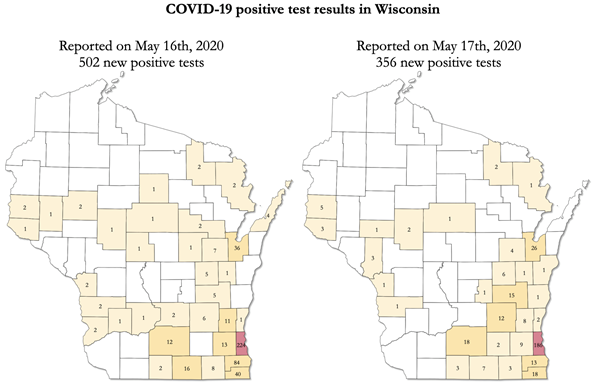
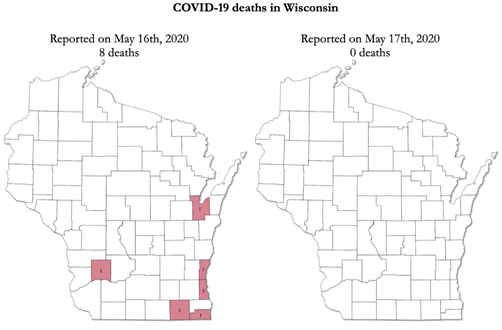
Sources:
Wisconsin Hospital Association (WHA) COVID-19 Situational Awareness Update site
DHS COVID-19: County Data; https://www.dhs.wisconsin.gov/covid-19/county.htm
Badger Bounce Back Gating Criteria
Over the weekend half of Governor Tony Evers’ Badger Bounce Back gating criteria are now showing red, indicating the gating criteria is not being met for 3 indicators;
- Downward trajectory of influenza-like illnesses (ILI) reported within a 14-day period.
- Downward trajectory of COVID-like syndromic cases reported within a 14-day period.
- Downward trajectory of positive tests as a percent of total tests within a 14-day period. (the new one)
All of the indicators are displaying a downward trend but DHS analysis suggests it is not statistically significant.
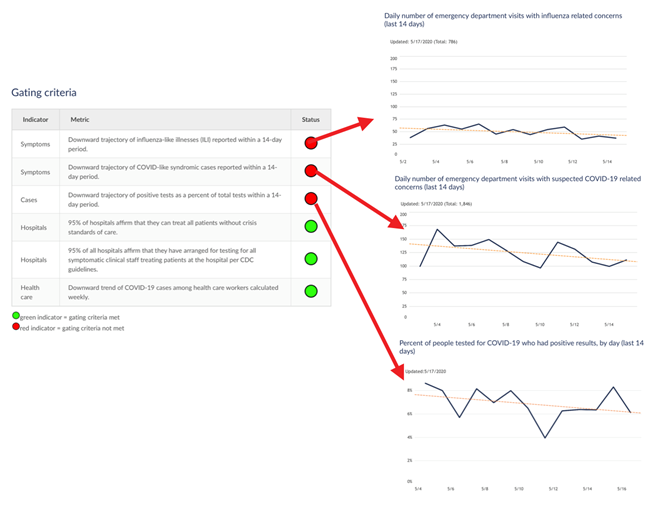
Weekend News Shows and COVID-19
Governor Evers on UpFront with Adrienne Pedersen
UpFront with Adrienne Pedersen hosted Governor Tony Evers on their Sunday program. Of note from the interview;
- The Governor said that he and Legislative leaders will meet this week, but wanted to be clear that the Administrative Rule process is a long and “archaic” process, and said it will be at least two weeks before we see something.
- He said the meeting with lawmakers last week was “friendly,” but didn’t envision that there would be a “grand bargain.” He said Republicans control the process and can remove any provisions that they don’t agree with.
- When asked something that would be positive coming out of the Administrative Rule process, the Governor suggested that having a communications plan, in the event of a surge, would be a positive, but didn’t envision any restrictions being reinstated through this process.
- When asked if requiring everyone to wear masks was a good idea, the Governor responded that he believed it would be, but said that the Supreme Court made it “abundantly clear” they don’t have the power to require anyone to do anything. He suggested that businesses and individuals look to the WEDC Reopen Guidelines.
- When asked about how long it will take Wisconsin to get back to normal, Governor Evers suggested at least half a year, or as some economists suggested a full-year, but that normal won’t be the old normal.
Link to video
Maj. Leader Steineke and Gov. Evers on Here & Now-WI Public Television
Assembly Majority Leader Jim Steinke (R-Kaukauna) was interviewed by Fredericka Fryberg. Of note from the interview;
- Majority Leader Steineke expressed disappointment that things got to this point, that the Supreme Court had to get involved, would have preferred to have negotiations.
- When asked about the Governor’s Scope Statement and its similarity to the original “Safer-At-Home” order, and Steineke expressed concern that it continues to appear to be a statewide approach and not a regional approach. He hopes that the Governor changes that approach in the rules that are proposed.
- When asked about the local authority health orders, Steineke said its well within the authority of those local governments and would rather see that approach than the statewide.
Link to video.
Governor Evers also appeared on the episode, of note from his interview was the following:
- Governor Evers was disappointed in the decision of the Supreme Court and concerned about the gatherings that happened immediately after the ruling.
- When asked about the Administrative Rule process, he reinforced that there isn’t going to be a grand bargain, because Republicans are happy with what now exists.
- When asked about Joint Committee for Review Administrative Rules Co-Chair Steve Nass’s reaction to the scope statement, he said that he should wait to see the draft rule before commenting, because this is just a scope statement, however he noted that the Republicans have already said they don’t want any infringements on what has already opened up.
- Governor Evers said he is hopeful that people continue to remain at open and limit their going out.
Link to video.
Gov. Evers and Maj. Leader Steineke on Capital City Sunday
Of note in Governor Evers’ interview with Emilee Fannon were the following:
- Gov. Evers said reopening the schools in the Fall should be the goal, but there should also be a plan A, B and C. They are looking at potential plans of staggering in-person attendance, whereby students spend a limited amount of time in the classroom in smaller class sizes and the rest of the time attend online.
- Regarding reopening UW campuses, he said that is more complicated than K-12 schools, and that they will need to make a decision soon on that.
- When asked whether to host the DNC Convention, which was rescheduled to take place in Milwaukee in August, in person or virtually, Gov. Evers said it is probably a smarter decision to host it virtually.
- He is encouraging that businesses that are re-opening or who are considering to re-open to utilize the WEDC re-opening guidelines.
Link to video.
Of note in Majority Leader Steineke’s interview with Emilee Fannon were the following:
- Maj. Leader Steineke was hoping what happened with going from no restrictions to wide open would have been avoided if the Governor would have negotiated with the Legislature prior to the Supreme Court ruling.
- He noted that the original of the “Safer-At-Home” order was to ensure hospitals were not overwhelmed and operating in crisis capacity, and since that has been established, businesses should be able to start re-opening, using the CDC guidelines to keep their customers and employees safe.
- Leader Steinke said that everyone is expecting an increase in positive cases associated with reopening the economy, said that is to be expected at any point, whether it was on May 26th or now, but the point of the order was to prep the hospitals to be able to be ready for that surge.
Link to video.
Updated Charts
Daily Numbers:
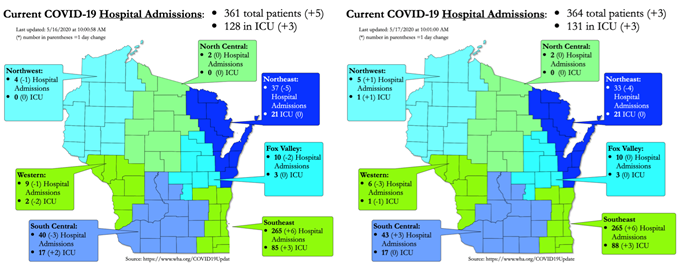
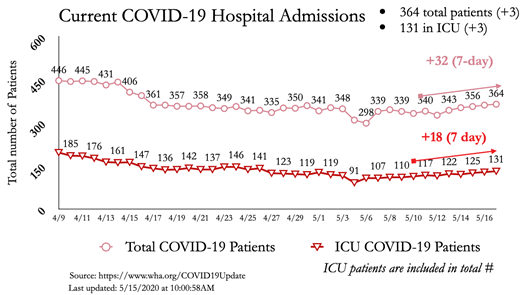
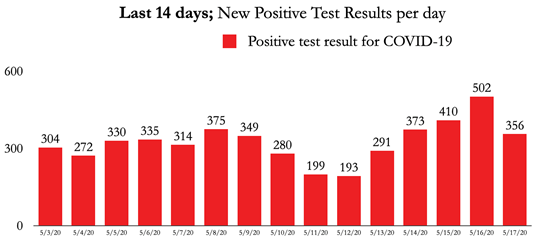
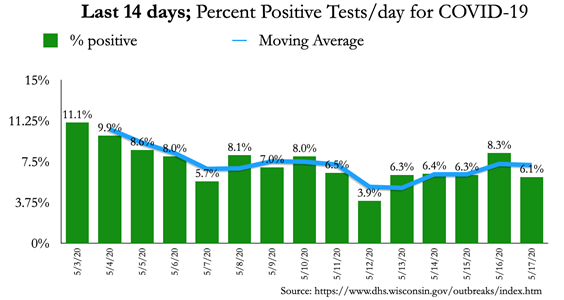
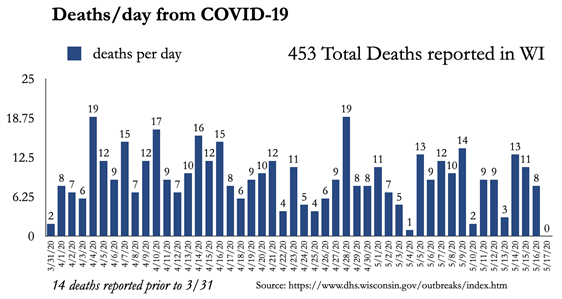
Cumulative Numbers:
